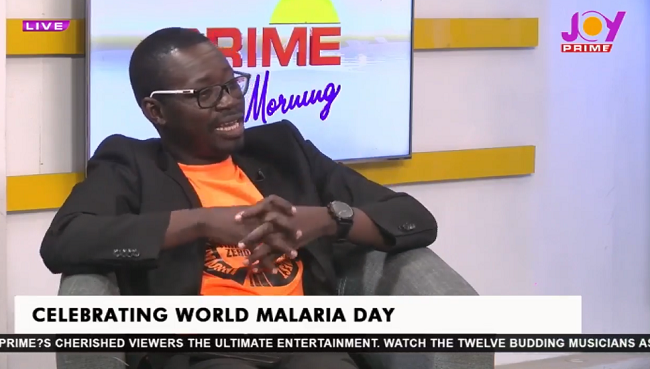All Ghanaian residents have been advised to join the fight against the total eradication of malaria in the country.
Malaria is a life-threatening disease caused by parasites that are transmitted to people through the bites of infected female Anopheles mosquitoes. It varies based on the species of Plasmodium.
Between January and September 2022, Ghana recorded a total of 3,745,398 confirmed malaria infections out of 7,749,627 tests conducted, data shown by the National Malaria Elimination Programme (NMEP).
The figure shows a decrease in malaria infection as compared to 4,133,020 malaria cases recorded in the same period in 2021.
Also, the country has witnessed a reduction in malaria deaths, from 196 in 2021 to 120 in 2022.
Considering the progress in the management of malaria cases in the country, the Deputy Programmes Manager of the National Malaria Elimination Programme, Dr Nana Peprah, who spoke on Joy Prime’s morning show, has called on individuals to support the fight.
He said complete eradication of the ailment can only be done with the help of the media and opinion leaders who are closer to the citizenry.
"We cannot eliminate malaria without individuals owning the fight. We need to get everybody on board to agree that this is the opportunity for us to eliminate it," he said on Tuesday.
Regardless of the fact that most people have complained about the hotness of the mosquito nets, the medical practitioner entreated the public to utilise the interventions available.
Ghana has become the first country in the world to approve a new malaria vaccine from Oxford University.
The vaccine (R21) has been described as a "world-changer" by the scientists who developed it and appears to be hugely effective, in stark contrast to previous ventures in the same field.
The mosquito-borne disease kills more than 600,000 people each year, most of them children in Africa.
Despite the arrival of the vaccine in the country, Dr Nana Peprah noted that it is still undergoing some medical pruning for total approval of implementation by stakeholders.
"It’s looking good, but it's early days. At the programme level, we have to wait for all the approval processes to be done, and stakeholders will agree that let’s start implementation before we start. So, for now, it is RTSS until we have approval processes completed," the Deputy Programmes Manager notified.
According to a survey by the Ghana Statistical Service, the Oti region has the highest number of malaria cases at 15%.
People across the globe celebrate World Malaria Day on April 25, 2023, every year. The theme for this year is "Time to Deliver Zero Malaria: Invest, innovate, implement."
As part of the education, people are required to keep their surroundings clean to avoid mosquitoes, especially with the invasion of a new breed of mosquito known as Anopheles stephensi.
Latest Stories
-
32 youth receive business starter packs from Ghana Grows
1 minute -
NSA Boss visits reptile-breeding Azumah Nelson Youth Centre
4 minutes -
It is unfair to blame gov’t for power crisis – Prof Sharif Khalid
16 minutes -
Unpredictable cedi appreciation could hurt businesses – Kenneth Thompson warns
22 minutes -
Cedi appreciation: We must build reserves that allow long-term predictability – Prof Bopkin
33 minutes -
Nine reported killed in Russian strike on civilian bus in Ukraine
57 minutes -
Inaction is the main cause of challenge in power sector – Ing. Amissah-Arthur
57 minutes -
Ghana’s marine economy: A strategic choice between fishing and coastal tourism
1 hour -
Bad Power Purchase Agreements signed by previous NDC gov’t coming back to haunt them – Ahiagbah
1 hour -
Support private sector role in ECG power distribution – Prof Bopkin
2 hours -
Energy sector reforms crucial for economic stability – Prof Bokpin
2 hours -
Galamsey: 9 arrested, 4 excavators seized in raid at Akani
2 hours -
Livestream: Newsfile discusses looming power crisis, cedi depreciation and dollar gift saga
3 hours -
Only captains will be allowed to approach referee in the Premier League next season
3 hours -
Man Utd co-owner Ratcliffe ‘loses quarter of total wealth’
4 hours

